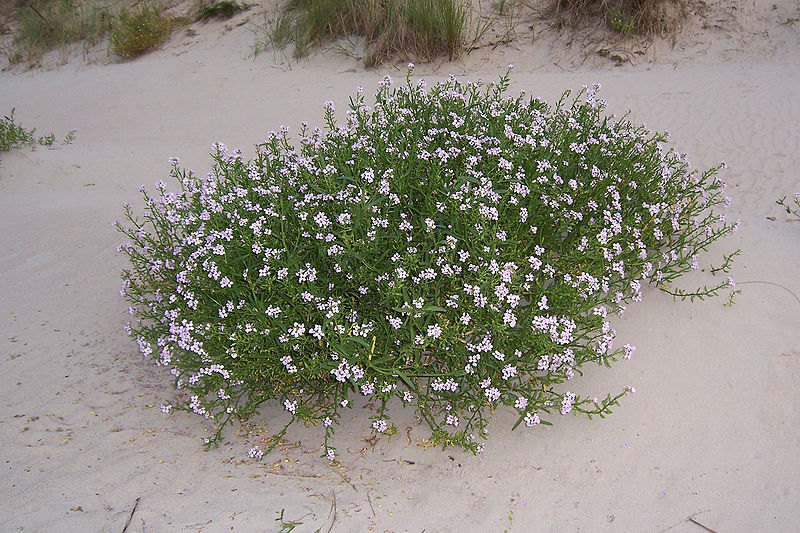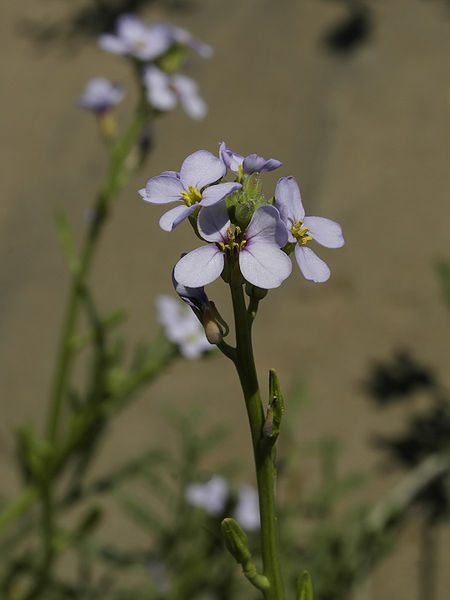 |
|
http://de.wikipedia.org/wiki/Benutzer:Godewind |
 |
| http://commons.wikimedia.org/wiki/User:Lycaon |
Translate this page:
Summary
Physical Characteristics

 Cakile_maritima is a ANNUAL growing to 0.3 m (1ft) by 0.3 m (1ft in).
Cakile_maritima is a ANNUAL growing to 0.3 m (1ft) by 0.3 m (1ft in).
See above for USDA hardiness. It is hardy to UK zone 6 and is not frost tender. It is in flower from June to August, and the seeds ripen from August to September. The species is hermaphrodite (has both male and female organs) and is pollinated by Bees, flies, beetles, Lepidoptera (Moths & Butterflies).
Suitable for: light (sandy) soils, prefers well-drained soil and can grow in nutritionally poor soil. Suitable pH: mildly acid, neutral and basic (mildly alkaline) soils. It cannot grow in the shade. It prefers moist soil. The plant can tolerate maritime exposure.
UK Hardiness Map
US Hardiness Map
Synonyms
C. edentula. non Hook. Bunias cakile.
Plant Habitats
Edible Uses
Leaves, stems, flower buds and immature seedpods - raw or cooked. They are rich in vitamin C but have a very bitter taste[4, 66]. Used mainly as a flavouring[132]. Very young leaves can be added to salads whilst older leaves can be mixed with milder tasting leaves and used as a potherb[183, K]. Root - dried and ground into a powder, then mixed with cereal flours and used to make bread[2]. A famine food, it is only used in times of scarcity[183]. The seed contains a fatty oil[74]. No more details are given.
References More on Edible Uses
Medicinal Uses
Plants For A Future can not take any responsibility for any adverse effects from the use of plants. Always seek advice from a professional before using a plant medicinally.
None known
References More on Medicinal Uses
The Bookshop: Edible Plant Books
Our Latest books on Perennial Plants For Food Forests and Permaculture Gardens in paperback or digital formats.

Edible Tropical Plants
Food Forest Plants for Hotter Conditions: 250+ Plants For Tropical Food Forests & Permaculture Gardens.
More

Edible Temperate Plants
Plants for Your Food Forest: 500 Plants for Temperate Food Forests & Permaculture Gardens.
More

More Books
PFAF have eight books available in paperback and digital formats. Browse the shop for more information.
Shop Now
Other Uses
References More on Other Uses
Cultivation details
Prefers a light well-drained soil and a sunny position[1, 200]. Plants are easily grown in a garden situation and can self-sow if the ground is disturbed by hoeing etc[K]. This species is closely related to C. edentula, which is native to N. America[17]. The seed is often dispersed by floating in sea water[17].
References Carbon Farming Information and Carbon Sequestration Information
Temperature Converter
Type a value in the Celsius field to convert the value to Fahrenheit:
Fahrenheit:
The PFAF Bookshop
Plants For A Future have a number of books available in paperback and digital form. Book titles include Edible Plants, Edible Perennials, Edible Trees,Edible Shrubs, Woodland Gardening, and Temperate Food Forest Plants. Our new book is Food Forest Plants For Hotter Conditions (Tropical and Sub-Tropical).
Shop Now
Plant Propagation
Seed - sow late spring or early autumn in situ. Germination is usually rapid.
Other Names
If available other names are mentioned here
Native Range
TEMPERATE ASIA: Iran, Israel (west), Syria, Turkey, Russian Federation-Ciscaucasia (Ciscaucasia), Georgia EUROPE: Denmark, Finland, United Kingdom, Iceland, Norway, Belgium, Germany, Netherlands, Poland, Russian Federation (European part), Estonia, Ukraine (incl. Krym), Albania, Bulgaria, Greece, Croatia, Italy, Montenegro, Romania, Serbia, Slovenia, Spain, France, Portugal AFRICA: Spain (Canarias), Portugal (Madeira Islands), Algeria, Egypt, Libya, Morocco, Tunisia
Weed Potential
Right plant wrong place. We are currently updating this section.
Please note that a plant may be invasive in one area but may not in your area so it’s worth checking.
Conservation Status
IUCN Red List of Threatened Plants Status :

Growth: S = slow M = medium F = fast. Soil: L = light (sandy) M = medium H = heavy (clay). pH: A = acid N = neutral B = basic (alkaline). Shade: F = full shade S = semi-shade N = no shade. Moisture: D = dry M = Moist We = wet Wa = water.
Expert comment
Author
Scop.
Botanical References
17200
Links / References
For a list of references used on this page please go here
Readers comment
| Add a comment |
|
If you have important information about this plant that may help other users please add a comment or link below. Only comments or links that are felt to be directly relevant to a plant will be included. If you think a comment/link or information contained on this page is inaccurate or misleading we would welcome your feedback at [email protected]. If you have questions about a plant please use the Forum on this website as we do not have the resources to answer questions ourselves.
* Please note: the comments by website users are not necessarily those held by PFAF and may give misleading or inaccurate information.
To leave a comment please Register or login here All comments need to be approved so will not appear immediately.
|
Subject : Cakile_maritima
|
|
|
|